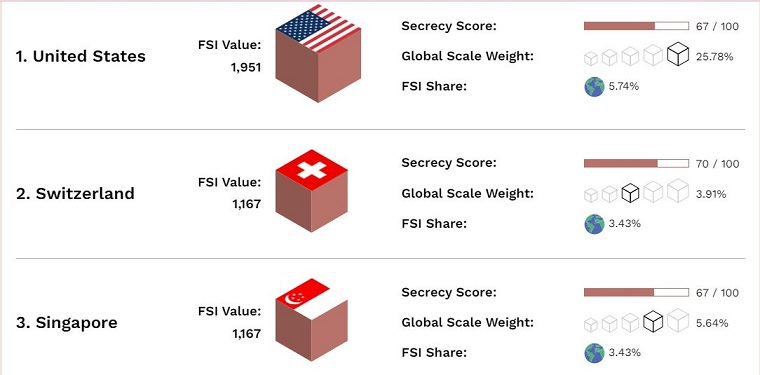 The United States is the world’s largest enabler of financial secrecy, surpassing notorious tax havens like Switzerland, the Cayman Islands and Bermuda, according to an analysis by the Tax Justice Network released last week.
The United States is the world’s largest enabler of financial secrecy, surpassing notorious tax havens like Switzerland, the Cayman Islands and Bermuda, according to an analysis by the Tax Justice Network released last week.
For the first time, the US tops the biennial Financial Secrecy Index, TJN’s global ranking that measures how much each country’s financial system promotes money laundering and the shielding of assets. Rounding out the top three in this year’s index are Switzerland and Singapore.
The US’s refusal to share information about non-residents’ financial accounts with foreign tax authorities was a key factor in its high ranking. Countries that did not meet international standards for information-sharing were graded more harshly in this year’s index, the transparency advocacy group reported.
The US financial services industry also increased the amount of services it provides to foreigners by 21% since 2020, the report states. Last year, a TJN study found that the US’s friendly non-resident tax laws cost the rest of the world nearly US$20 billion in lost tax revenue per year.
Alex Cobham, TJN chief executive, said that if the United Kingdom and all its dependent territories were combined, they would outrank the US in fueling global financial secrecy, but the index ranks each jurisdiction separately.
The findings come as global advocates renew calls for beneficial ownership registers, which would reveal the true owners behind anonymous offshore companies.
Along with the US, five G-7 nations are responsible for slashing progress in financial secrecy reform by more than half: the United Kingdom, Japan, Germany and Italy, says TJN.
Meanwhile, the Cayman Islands, which ranked first in 2020, dramatically dropped to No. 14 in this year’s index, after disclosing new data on the financial services it provides to foreigners.
“The G7 must make clear where they stand in the fight against financial secrecy by committing to a global asset register,” Cobham said in a statement. A global asset register would combine public and private beneficial ownership databases to help law enforcement identify the owners behind hidden assets.
TJN determines each country’s rankings based on several measurements, including knowledge of and transparency on beneficial ownership, tax integrity, and international standards and cooperation. A higher ranking does not necessarily indicate that a country has worse financial secrecy laws but that it plays a larger role in fueling global secrecy.
TJN singled out lax trust laws as a major drawback to financial reform in its report.
The US received the worst possible score on trust transparency for its failure to make public information on trusts and other private foundations registered in the country.-ICIJ
(148 VIEWS)

